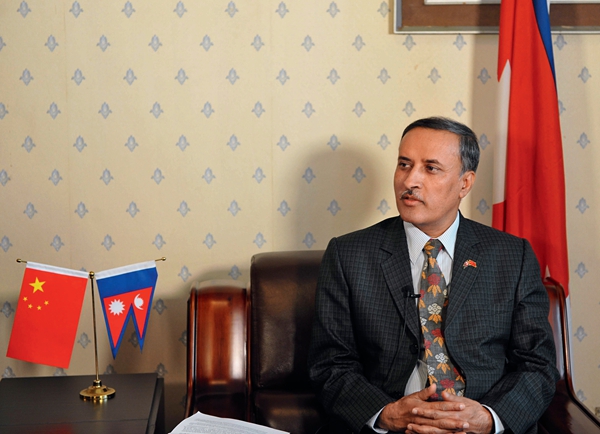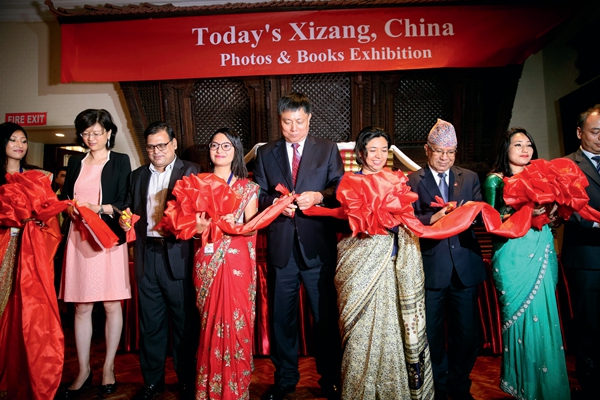By staff reporters LI YUAN, CHEN SIJIA & LIU JIA
By staff reporters LI YUAN, CHEN SIJIA & LIU JIA
LEELA Mani Paudyal took up his post as Ambassador of Nepal to China in November 2016, but his links with China go back around 20 years. He thus qualifies for the title "Old China Hand." Paudyal applauds China's proposal of the Belt and Road Initiative, and believes it has gained widespread recognition throughout the world. He is convinced it could build a new structure for the world economy and also bring opportunities for nations along the routes. Paudyal hopes that Nepal, as a friendly neighboring country, may participate in the construction and development of the Belt and Road, and strengthen cooperation and exchanges with China and relevant countries.
Old China Hand
Paudyal's first visit to China was in 1999, as a member of Nepal's visiting delegation. During that trip, he made a tour of many Chinese cities and was deeply impressed by China's rapid development. From 2003 to 2007, Paudyal worked as consul general at the Consulate General of Nepal in Lhasa. He then returned to Nepal and has since served in many departments of the government of Nepal, including the Ministry of Tourism, Civil Affairs, and Information. During that time, he has had abundant contacts and dealings with the Chinese government.

Although he has been the Ambassador to China for only several months, Paudyal has proven to be a genuine old China hand. During his short time in office, Paudyal has organized 13 activities with various Chinese cities themed on economy and trade, investment, and cultural exchanges. They include Nepal's New Year Culture Promotion, Nepal’s celebration of the Buddha's birthday, the investment and commerce fair, and the visit of Chinese monks to Lumbini.
"I have had close relations with China for about 20 years, and witnessed China's impressive economic development. I am pleased to see China's progress. China and Nepal are good neighbors, and their bilateral relations have substantial bearing on the stability and prosperity of both nations. In the past several months, we have organized several big events and activities to promote economic and cultural exchanges between our two countries. I believe that the China-Nepal relationship will improve in tandem with the rising living standards of impoverished people that stem from a more developed society," Paudyal said.
Paudyal recently began learning Chinese, and can use everyday greetings and speak a few simple sentences. He uses the social media app on his cellphone and books online courses. Whenever work keeps him from his online study, he always finds the time to make it up.
Lifting South Asia out of Poverty
"I have kept a close eye on the Belt and Road Initiative since its proposal by Chinese President Xi Jinping, and am interested in its principles and impact on China and South Asia," Paudyal told China Today. In his opinion, the initiative is an inclusive framework which can bring opportunities to and meet the needs of both Nepal and China.
"Nepal got left behind due to long-term political reform. We are in desperate need of infrastructure, food, and technology, as well as improvements that enable us to stimulate the economy and enhance people's living standards. China offers help to neighboring countries and to a developing Nepal, and its people are thankful for this," Paudyal said.

China's Tibet Autonomous Region is adjacent to India, Bhutan, and Nepal. It is an important window for China's link to South Asia, and plays a vital role in the Belt and Road Initiative. The government of Nepal and the Chinese government are planning to build an economic belt in the Himalayan region in a joint effort to alleviate poverty in South Asian countries.
"China has made great progress in poverty alleviation which sets a good example for other countries. We should learn from the Chinese experience, and through cooperation within the Belt and Road framework we could make full use of the national resources to lift people out of poverty," Paudyal said.
Nepal's Vice Premier and Financial Minister led a delegation, which included their transportation and communication ministers, to the Belt and Road Forum for International Cooperation held in Beijing on May 14. At its conclusion the delegation signed an MOU with China and a package of agreements. They included an infrastructure construction deal worth of billions of rupees which is expected to give fresh impetus to China-Nepal cooperation.
Paudyal remarked that challenges also exist. "Nepal has been ill prepared. But we realize we must seize this opportunity because the living standards of people in Nepal are in sore need of rapid improvement."
However, Paudyal is optimistic about the future, because Nepal has made some economic progress due to its political reform. "If we can catch up and on the Belt and Road Initiative train, Nepal is sure to develop faster!"
More Exchanges, Better Understanding
Paudyal went on to say that, besides economic opportunities, the Belt and Road Initiative also promotes cultural cooperation and people-to-people exchanges. "Cooperative potential exists at all levels, from governments to non-governmental organizations and the private sector. We welcome with an open mind various cooperation models that usher in a win-win future."
On Nepal's New Year's Day, the Embassy of Nepal in Beijing organized a big cultural show in western Fujian which attracted more than 500 spectators. More cultural events introducing Nepal are planned in many Chinese cities, for example, Beijing, Chengdu, Lanzhou, Hangzhou, and Guangzhou. Chinese media will also be invited to Nepal to meet its local residents. Paudyal said that the Embassy is willing to offer as much help as possible to any Chinese organization that wishes to hold bilateral activities. "China-Nepal bilateral activities will boost people-to-people exchanges which break down barriers, avoid collisions and avoid the blind pursuit of economic interests."
In conclusion, Paudyal voiced his personal invitation to all Chinese people, saying: "There are many places I would like to recommend to Chinese tourists, and they all deserve your exploration." He spoke of Nepal's introduction of a new tourism plan which guides visitors around its local villages where they can stay with local farmers, experience their lifestyle and participate in their daily activities from dawn to dark. This would be the chance to live the life of a Nepal local.